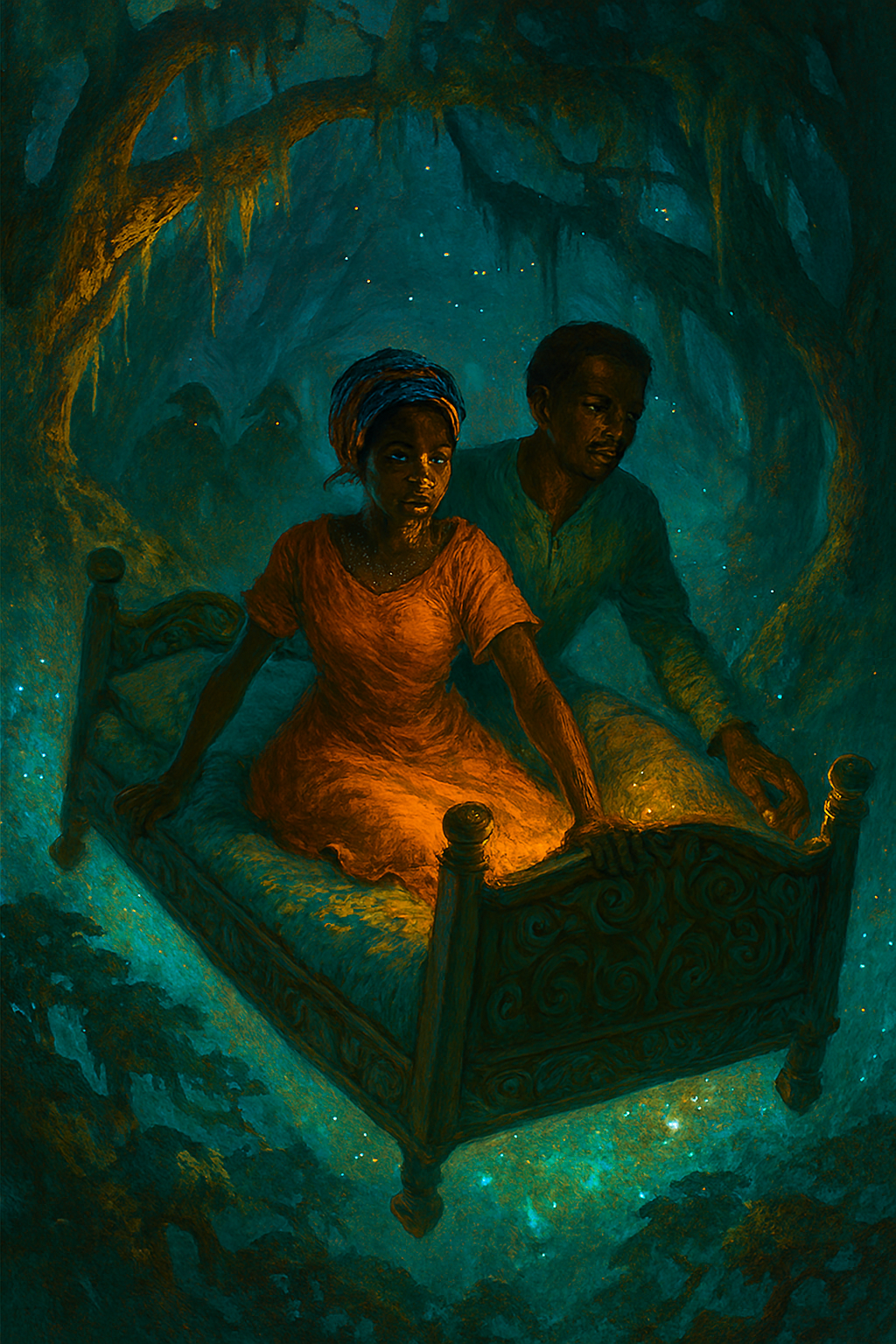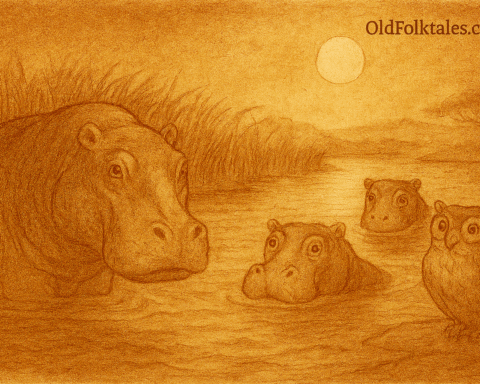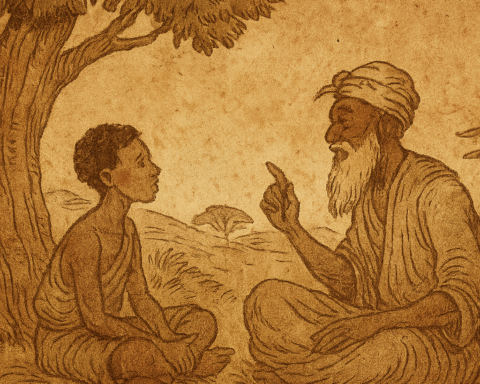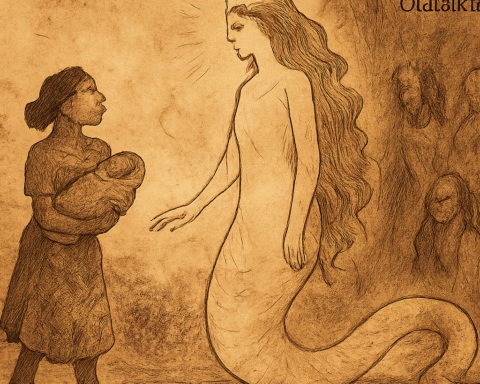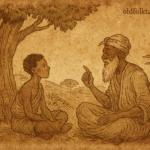In the ancient kingdom of Togo, where the red earth meets endless skies and baobab trees stretch their mighty arms toward heaven, there once ruled a powerful king in the grand town of Notsé. His palace walls gleamed with mud brick and palm thatch, and his courtyard echoed with the sounds of talking drums and the laughter of his people. Yet for all his wealth and power, the king’s greatest treasure was his only son, Prince Ayaba Hlini, a young man whose smile could brighten the darkest harmattan winds and whose presence brought joy to his father’s aging heart.
The seasons turned as they always had, and when the time came for the great hunt, Prince Hlini eagerly joined the expedition into the mysterious Atakpamé forests. These ancient woodlands were thick with secrets, where towering mahogany trees created a canopy so dense that even noon felt like twilight, and where the calls of hornbills and the rustle of leaves whispered stories older than memory itself. It was here, among the twisted vines and shadowy paths, that Prince Hlini vanished without a trace.
When the hunting party returned without the prince, the king’s heart shattered like a broken calabash. His anguished cries echoed through the palace corridors, and his tears fell like the first rains of the wet season. Desperate to find his beloved son, the king sent his messengers throughout the land, their urgent gong-gong drums beating a rhythm of hope and desperation. The royal proclamation rang out from every village square: “Whoever brings back Prince Hlini shall receive a hundred head of cattle, chests of gold, and lands as far as the eye can see.”
Also read: Princess Akoua and the Good Stepmother
The promise drew warriors with muscles like iron, hunters who could track a leopard through stone, and wise diviners who claimed to speak with the ancestors themselves. One by one, they ventured into the Atakpamé forests, their confidence high and their hearts brave. Yet one by one, they returned empty-handed, their heads bowed in defeat and their spirits crushed by the forest’s unyielding silence.
Far from the king’s magnificent palace, in a humble village where thatched huts dotted the landscape like scattered seeds, lived an old shepherd and his remarkable daughter, Signefi. Though her daily life was simple—guiding bleating goats to pasture, gathering firewood from the forest’s edge, and helping her father mend their modest dwelling—Signefi possessed something far more valuable than gold or cattle. Her mind was as sharp as a blacksmith’s finest blade, and her heart held a courage that burned bright as the evening cooking fires.
When word of the missing prince reached their village, carried by traveling merchants and wandering griots, Signefi listened with growing determination. That evening, as she and her father shared their simple meal of yam and palm soup beneath the star-scattered sky, she spoke the words that would change everything: “Let me try, Baba. Perhaps the spirits who watch over the forgotten paths will guide my steps where others have failed.”
Her father’s weathered hands trembled as he looked into his daughter’s determined eyes. Though fear gripped his heart like thorns, he recognized the fire of destiny burning within her and gave his blessing with tears of both pride and worry.
At dawn, Signefi set forth with nothing but her walking stick, a small bundle of provisions, and an unshakeable faith in her mission. She followed ancient trails that wound through rolling hills where guinea fowl called to each other, crossed streams where kingfishers darted like living jewels, and stopped at every settlement to ask her careful questions. Village elders, their faces mapped with wisdom lines, shook their heads sadly. Palm-wine tappers, high in their coconut trees, had seen nothing unusual. Even the market women, who knew every whisper of gossip for miles around, could offer no clues.
As the sun began its descent toward the western horizon, painting the sky in shades of orange and purple that rivaled the finest kente cloth, Signefi found herself before a cave whose mouth yawned like a giant’s hungry maw. The rocky entrance was partly hidden by curtains of hanging vines, and something deep within her spirit whispered that this was where her answers lay.
Stepping carefully into the cool darkness, she discovered a chamber lit by mysterious glowing stones. Two wooden beds, carved with intricate patterns that seemed to shimmer in the strange light, sat side by side. Upon one of them lay a figure that made Signefi’s heart leap with recognition Prince Hlini, motionless as death yet breathing steadily, trapped in what could only be an enchanted sleep.
Quick as a mongoose sensing danger, Signefi concealed herself behind a large boulder just as heavy footsteps echoed through the cave. Two enormous women entered, their presence filling the chamber with an aura of ancient and terrible power. These were the awo forest witches whose eyes blazed like red coals and whose very breath seemed to carry the scent of dark magic. The elder witch, her voice honey-sweet yet terrifying, clapped her hands with the crack of thunder.
Instantly, three magnificent white swans glided into the cave, their song more beautiful than any kora melody, more enchanting than the sweetest praise-singing. As their ethereal voices filled the air, Prince Hlini’s eyes fluttered open like butterflies awakening from their cocoons.
“My handsome prince,” the elder witch crooned, her words dripping with false affection, “accept me as your wife, and all the treasures of this forest realm shall be yours to command.”
But Prince Hlini, despite the magical influence that held him captive, shook his head with quiet dignity. “My heart and my duty belong to my people,” he declared, his voice steady despite his predicament.
The witches’ faces twisted with rage, their eyes flashing dangerously, yet something held them back from harming their captive. They retreated into the deeper recesses of the cave, leaving the prince to sink back into his unnatural slumber.
When dawn broke and the cave fell silent once more, Signefi emerged from her hiding place like a spirit herself. She approached the sleeping prince and, remembering the protective chants her grandmother had whispered to her as a child, spoke words of power and awakening. Hlini’s eyes opened, clear and alert, and together they began to weave a plan as intricate as a spider’s web.
The next evening, when the witches returned, Prince Hlini greeted them with a smile that seemed genuine. His voice carried new warmth as he spoke: “Truly, your dwelling is magnificent beyond imagination! I have heard tales that your very beds can soar through the heavens themselves. Could such wonders really be possible?”
The younger witch, her pride swelling like a river in flood season, could not resist revealing the secret incantation that gave their beds the power of flight. Later, as the night deepened, she boasted even more recklessly about their greatest treasure: a mystical egg hidden within an ornate gourd, decorated with symbols that hurt to look upon directly.
“In this egg,” she whispered conspiratorially, “rests the very essence of our lives. Without it, we would be less than dust upon the wind.”
The following morning, as the witches ventured out to collect palm nuts for their magical brews, Hlini and Signefi commandeered one of the flying beds. Following the ancient chant they had overheard, they soared silently through the forest canopy, tracking the witches to a clearing where ancient trees formed a natural amphitheater.
Hidden among the leaves, they watched in fascination and horror as the two sisters played with their precious egg, tossing it carelessly between them like children with a rubber ball, laughing with voices that made the very trees shudder.
This was their moment. With the lightning reflexes of a hunter and the courage of a true prince, Hlini launched himself from their hiding place. His hands closed around the egg just as the witches realized their danger. Without hesitation, he hurled it against the largest stone in the clearing.
The egg shattered with a sound like the world breaking, and instantly the two witches’ screams pierced the air. Their bodies began to shrivel like leaves in a great fire, their forms crumbling to dust that the forest wind scattered to the four directions, until nothing remained of their ancient evil.
With the witches destroyed, Prince Hlini and Signefi gathered the treasures that had been hoarded in the cave for generations, cowrie shells that gleamed like small moons, beads of every color imaginable, and gold that caught the light like captured sunbeams. Loading their bounty onto both magical beds, they rose into the sky like eagles, soaring over the Atakpamé forests toward the distant walls of Notsé.
When the people saw their beloved prince returning through the clouds, the celebration that erupted shook the very foundations of the earth. Drums thundered their joy, voices rose in songs of thanksgiving, and dancing filled every street and courtyard. The king, tears streaming down his face like rivers of pure happiness, embraced his son and then turned to honor the brave shepherd’s daughter who had accomplished what no warrior could achieve.
“Today we have learned a truth that will echo through all our generations,” the king proclaimed to his assembled people. “Wisdom shines brighter than gold, and courage runs deeper than noble blood.”
In the fullness of time, Prince Hlini and Signefi were united in marriage, their wedding celebration lasting for seven days and seven nights. Their story became the favorite tale of every griot, sung in every market square and whispered around every evening fire. And the people of Togo learned that even when darkness seems absolute and hope appears lost, the combination of cleverness and bravery can light the way home.
Moral Lesson
This timeless folktale teaches us that true heroism doesn’t depend on strength, wealth, or noble birth. Signefi’s success came from her sharp mind, unwavering courage, and willingness to take action when others had given up. The story reminds us that wisdom and bravery, when combined with determination, can overcome even the most powerful obstacles. Sometimes the greatest solutions come from the most unexpected sources, and those who are underestimated by society may possess the very qualities needed to save the day.
Knowledge Check
Q1: Who was Prince Ayaba Hlini and why was he important to the kingdom of Togo? A1: Prince Ayaba Hlini was the only son of the king of Notsé in ancient Togo. He was described as “the joy of his old age,” making him not only the heir to the throne but also the king’s most precious treasure and the future of the kingdom.
Q2: What were the awo and what powers did they possess in Togolese folklore? A2: The awo were fearsome forest witches in Togolese tradition, described as giant women with eyes like burning coals. They possessed magical powers including enchanted sleep spells, flying beds controlled by secret chants, and the ability to command magical swans whose songs could awaken their victims.
Q3: How did Signefi demonstrate wisdom and courage in rescuing the prince? A3: Signefi showed wisdom by carefully observing the witches’ behavior, learning their secrets, and devising a strategic plan rather than attempting a direct confrontation. Her courage was evident in her willingness to enter the dangerous cave alone, hide among powerful witches, and take action when others had failed.
Q4: What was the significance of the magical egg in the story? A4: The magical egg represented the life force of the two witches, it was hidden in an ornate gourd and contained their very essence. When Prince Hlini shattered the egg, it destroyed the witches instantly, showing that even the most powerful magical beings can have hidden vulnerabilities.
Q5: What cultural values does this Togolese folktale emphasize? A5: The story emphasizes that wisdom and courage are more valuable than wealth or noble birth, that determination can overcome seemingly impossible obstacles, and that heroes can emerge from humble backgrounds. It reflects Togolese values of respecting intelligence, bravery, and moral character over social status.
Q6: How does the marriage of Prince Hlini and Signefi represent social ideals in the story? A6: Their marriage symbolizes the union of different social classes based on merit rather than birth, showing that true worth comes from character and actions. It represents the ideal that love and respect should be earned through courage and wisdom, not inherited through royal bloodlines.
Source: Togolese folktale, West Africa
